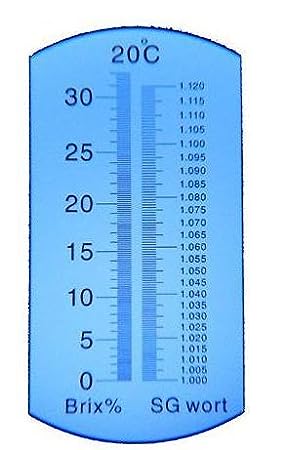eddiewould
Well-Known Member
Hey guys,
I like to use my refractometer during my sparge to keep track of where my runnings are at. However I'm concerned my readings might not be accurate (they seem to be inconsistent with my hydrometer for cooled, unfermented wort).
Here are the specs for my refractometer: (Hopefully the link works):
http://www.trademe.co.nz/Browse/Listing.aspx?id=450208419
It's supposedly designed for homebrewing and it's got markings for Brix as well as "specific gravity scale for unfermented wort". It's also got ATC so I've just been pippetting a few drops of my runnings (70c or so), giving it 30sec to stabilize and then taking a reading.
The specs do say "ATC for 10c to 30c" but small drops of wort are unlikely to stay at 70c for long right? I've also tried running the pippette (full of wort) under the cold tap for a few seconds before dispensing the wort and taking a reading - it didn't seem to make any difference, so I'm not convinced that temperature is the issue. (Note, I only take hydrometer readings when wort is room temperature i.e. 15-20c, and I adjust the hydrometer readings for temperature).
The refractometer came with a tool for calibrating it, but I've never bothered (I guess I'm partly scared of making things worse rather than better).
Assuming I've got some accurate scales, is there a way I can weigh out some DME (or table sugar?), add to a known quantity of water (so that I know what the gravity should be) and calibrate both my hydrometer and refractometer in one go?
If I calibrate my refractometer using light DME (say), will it be accurate for measuring the gravity of a stout?
Cheers,
Eddie
I like to use my refractometer during my sparge to keep track of where my runnings are at. However I'm concerned my readings might not be accurate (they seem to be inconsistent with my hydrometer for cooled, unfermented wort).
Here are the specs for my refractometer: (Hopefully the link works):
http://www.trademe.co.nz/Browse/Listing.aspx?id=450208419
It's supposedly designed for homebrewing and it's got markings for Brix as well as "specific gravity scale for unfermented wort". It's also got ATC so I've just been pippetting a few drops of my runnings (70c or so), giving it 30sec to stabilize and then taking a reading.
The specs do say "ATC for 10c to 30c" but small drops of wort are unlikely to stay at 70c for long right? I've also tried running the pippette (full of wort) under the cold tap for a few seconds before dispensing the wort and taking a reading - it didn't seem to make any difference, so I'm not convinced that temperature is the issue. (Note, I only take hydrometer readings when wort is room temperature i.e. 15-20c, and I adjust the hydrometer readings for temperature).
The refractometer came with a tool for calibrating it, but I've never bothered (I guess I'm partly scared of making things worse rather than better).
Assuming I've got some accurate scales, is there a way I can weigh out some DME (or table sugar?), add to a known quantity of water (so that I know what the gravity should be) and calibrate both my hydrometer and refractometer in one go?
If I calibrate my refractometer using light DME (say), will it be accurate for measuring the gravity of a stout?
Cheers,
Eddie



